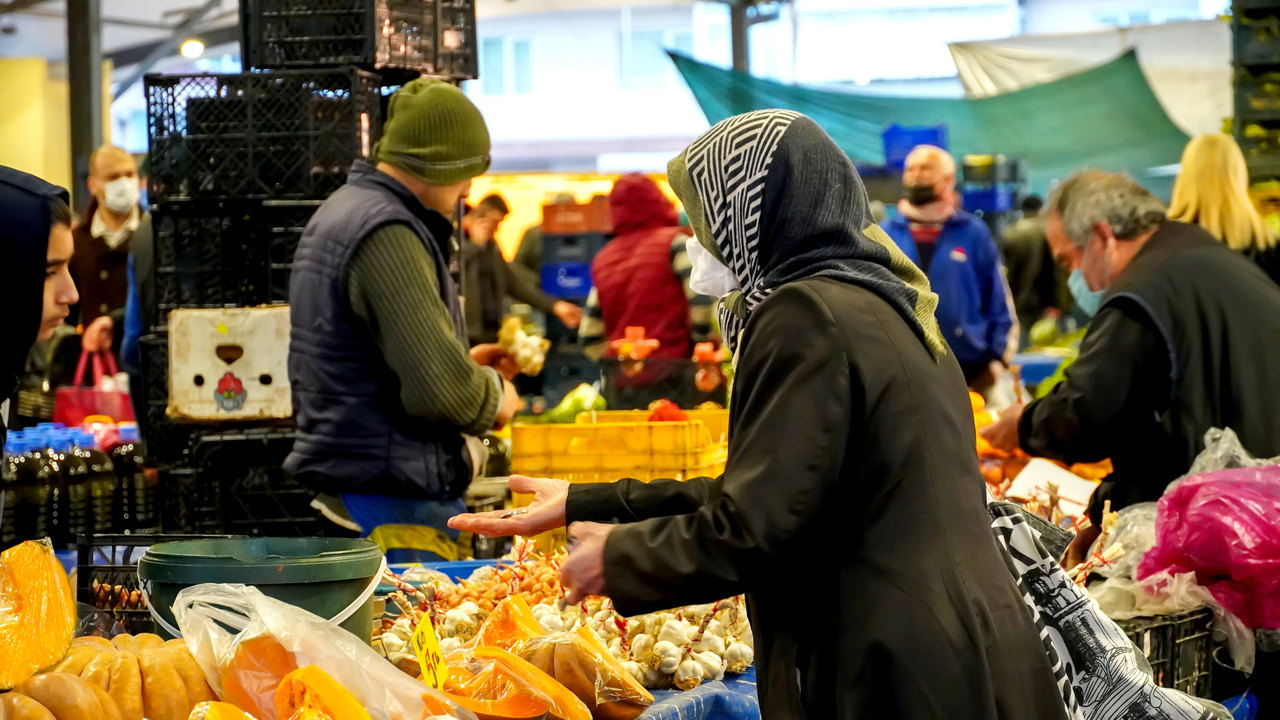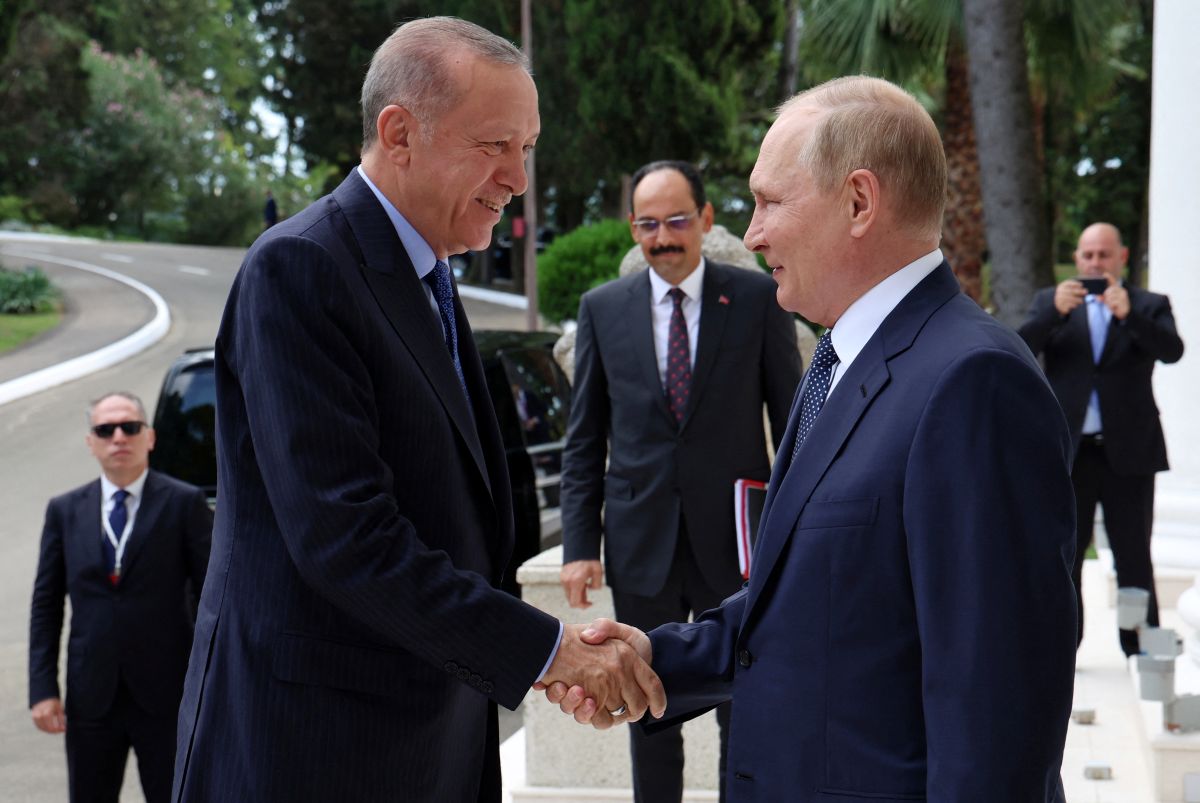Türkiye Struggling with Economic Problems and Foreign Policy
The ongoing crisis in the Turkish economy poses a risk of destabilisation in the EU’s southern neighbourhood. The intensification of the pauperisation of the society and brain drain may have an impact on the results of next year’s elections. The long-lasting economic difficulties are also prompting Türkiye to normalise relations with Arab states and Israel.
 İdil Toffolo/ Cover Images/ FORUM
İdil Toffolo/ Cover Images/ FORUM
With the introduction of the presidential system in Türkiye in 2018, Recep Tayyip Erdoğan promised to use presidential powers to revive the economy. The country struggled with structural problems even before the outbreak of the coronavirus pandemic, and its economic problems continue to accumulate. The current account deficit reached $21 billion in the first four months of this year, which corresponded to the whole of last year. The lack of independence of the Central Bank and Erdoğan’s personal decisions to nominate as the heads of this institution and the minister of the Treasury and Finance people who pursue a policy of low interest rates are also not favourable to ending the economic crisis.
Policy of Lowering Interest Rates
According to data from the state statistical office TÜIK, annual inflation in Türkiye in August this year amounted to 80.21%, the highest rate since September 1998. According to data from the independent ENAG Inflation Research Group, the annual rate of consumer price inflation in July reached 181.37%, much higher than the official statistic. According to Erdoğan, the rise in inflation is the result of high interest rates, which is why, in his opinion, it is justified to lower them in order to stimulate domestic investments and support export-oriented sectors. Erdoğan’s high interest rate attitude is probably partly motivated by his religious views—he considers it riba, interest or usury gain forbidden in Islam. At the end of last year, the government latched onto a narrative in which the Turkish economy cannot recover from the crisis because of interference by foreign powers. While Erdoğan does not say it outright, he is referring to the West, and the United States in particular. Currently, policymakers justify the level of inflation by the war in Ukraine, rising commodity prices, greed and the opportunism of producers. In addition, in June this year Erdoğan blamed Turkish citizens who invest their savings in a foreign currency. Regardless of the assessment of the sources of the crisis, the government is taking countermeasures to stop the decline of support for the ruling Justice and Development Party (AKP), which is in coalition with the Nationalist Movement Party (MHP). The minimum wage was raised by 50% to TRL 4,253 net, and in July it was increased to TRL 5,500 net. Another action taken by the government was to reduce VAT on basic food products from 8% to 1% and on basic hygiene products from 18% to 8%. In addition, in some cities in Turkey residents received special discount coupons that allows them to buy bread at lower prices. In June this year, parliament passed a decree limiting rent increases to a maximum of 25% a year until July next year, and Minister of Environment and Urbanisation Murat Kurum announced that some unused office space will be converted into apartments.
Society’s Reaction to the Crisis
Although the government has decided to raise the minimum wage, there still is growing concern in Turkish society about the economic crisis. At the same time, the ruling AKP and MHP electorate is convinced that external forces are responsible for the difficult economic situation in the country. At the beginning of this year, Turks were confronted with new price increases, which included a 50% rise in electricity prices for households and 125% for enterprises. This outraged traders, and in some places such as İstanbul, sellers began to display electricity bills in shop windows as an act of protest. In July, members of the Confederation of Public Workers’ Unions burned their payslips in the face of inflation. In some cities in Türkiye there were small-scale protests in which demonstrators demanded the president’s resignation. Surveys show that 63% of Turkish citizens believe their standard of living will deteriorate further over the next year, and 73% of Turks claim they will have difficulty paying their gas and electricity bills in the next six months. The opposition criticises the government for the economic crisis in the country, and its leaders declare that with the restoration of a strengthened parliamentary system, they will initiate legal action to ensure the full independence of the Central Bank in order to protect the institution from political interference.
High inflation in the country intensifies the pauperisation of society. According to World Bank estimates, the poverty rate in Türkiye increased to 12.2% in 2020 from 10.2% in 2019. The prospect of a lack of improvement in the standard of living is compelling young people and highly qualified workers to emigrate. According to data published in 2021 by Konrad Adenauer-Stiftung, the surveyed Turks in the 18-25 age group state that they would, if they had the opportunity, like to live in a European country (30.6%) or in the U.S. (15%). Only 27.1% of young Turks surveyed say they would like to stay in Türkiye. The number of asylum applications submitted by Turkish citizens to the EU and EFTA Member States increased by 45% compared to 2020 and exceeded 20,000 last year. Applications are directed primarily to Germany, France, and the Netherlands.
The Future of the Turkish Economy and Foreign Policy
The long-lasting disputes with the EU and the U.S.—two of the most important sources of investment in Türkiye—prompted decision-makers to start the process of normalisation with the countries of the Middle East. The government, faced with the prospect of elections next year, has made efforts to save the currency through financial deals with Saudi Arabia and the United Arab Emirates, strengthening ties with Qatar, and restoring diplomatic relations with Israel. These countries, unlike the EU and the US, do not criticise Türkiye for the state of democracy and problems with respecting human rights. The Turks are also looking for independence from the dollar, which is used to convert some payments for Russian natural gas into roubles. During Erdoğan’s visit to Lviv in August, Türkiye and Ukraine signed a memorandum of understanding on the reconstruction of Ukrainian infrastructure. According to the official announcement, Türkiye is to provide advisory and technical assistance in this regard. Moreover, Türkiye is also taking advantage of the international export successes of some companies, such as the defence sector, for internal policy. Thanks to the signed agreement, Erdoğan gained some claims ahead of next year’s parliamentary and presidential elections and calmed down business circles, pointing to the benefits supposedly opening up for construction companies close to the government. The progressing economic crisis in the country may also induce Turkish decision-makers to increase the political level of contacts with the authorities in Damascus, now limited to the intelligence services. This could initiate the return of refugees to Syria, which would allow the Turkish government to reduce the political costs associated with their stay in Türkiye. A survey from 2021 showed that 81.7% of Turks want Syrians to return to their country of origin, and this opinion is expressed by 84.5% of respondents that support the AKP.
Conclusions and Prospects
Economic problems are Türkiye’s main motivation to improve relations with the Arab Gulf states and Israel. However, the political causes of the disputes between them remain valid, which may hinder further rapprochement and, consequently, the achievement of the economic benefits that the Turkish government is counting on. The current economic problems may also make it difficult for Turkish decision-makers to pursue an active foreign policy, which may translate into limited investments, for example, in Ukraine.
The deteriorating economic situation in the country, along with the presence of refugees, whom Turks blame for lowering living standards, could lead to a poor result or even defeat of Erdoğan and the government coalition in next year’s elections. In the long run, the protracted crisis makes it likely that the emigration of Turks, including through irregular migration, will increase. Türkiye’s current economic perspective is negative, so the government coalition may try to re-employ the narrative about a potential mass-migration crisis to obtain economic aid from the EU, which is typically motivated by the need to support refugees. If the West does not react to Türkiye’s demands, that may induce Turkish decision-makers to strengthen the Eurasian foreign policy orientation. This argument is supported by the decision in August by Türkiye and Russia to intensify cooperation in the economic and energy spheres. A chance to stabilise the economic situation in the country can be seen in the restoration of the parliamentary system and the related mechanism of balance and control in the decision-making process. However, it will take years to recover from the economic crisis in which Türkiye finds itself. Poland could support this process, as well as EU aid to Türkiye, although conditional on the need to ensure the independence of the Central Bank.



